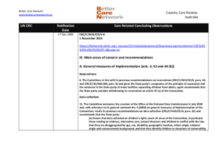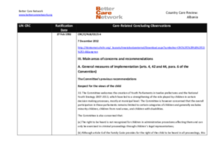Displaying 91 - 100 of 506
This study finds that the size of the nuclear family has a significant positive relationship with refugees’ mental health, whereas family separation has a significant negative relationship.
The objective of this study was to examine associations between being the subject of child protection reports in early childhood and diagnoses of mental disorders during middle childhood, by level of service response.
This country care review includes the care related Concluding Observations adopted by the Committee on the Rights of Persons with Disabilities and the Committee on the Rights of the Child.
This study explored the construct of mothering children during family‐centered substance use treatment using a transcendental phenomenological approach.
The authors of this study systematically compared parenting interventions offered in 12 maternal substance use treatment programs in one Canadian province with those described in the research literature.
The Bounce Project is a pilot youth-leadership mental health training programme co-designed with young people who have experienced out-of-home-care (OoHC). In this study, the authors evaluated the Bounce Project from the young people’s perspectives to explore the acceptability, successes and limitations of the training to promote the participant’s mental health and their contribution to system level change.
Looked after and adopted children are among the most vulnerable in our society and it is well established that they present with a higher prevalence of mental health problems than children who live with their birth family. This article presents a case study of a 15-year-old boy whose severe difficulties were understood and formulated in terms of ‘attachment problems’ for many years.
This country care review includes the Concluding Observations of the Committee on the Rights of the Child and the Committee on the Rights of Persons with Disabilities. The Committees' recommendations on the issue of Family Environment and Alternative Care, and other care relevant issues, are highlighted.
This qualitative study explored perspectives from young people with experience of OoHC in Melbourne, Australia regarding the promotion of mental health in OoHC. The study informed the subsequent development of a system-level intervention to support workers and carers in OoHC and evaluation of its implementation, the Ripple study.
The objective of this study was to compare the outcomes for the Neuro-Physiological Psychotherapy (NPP) intervention group to those of a control group.


